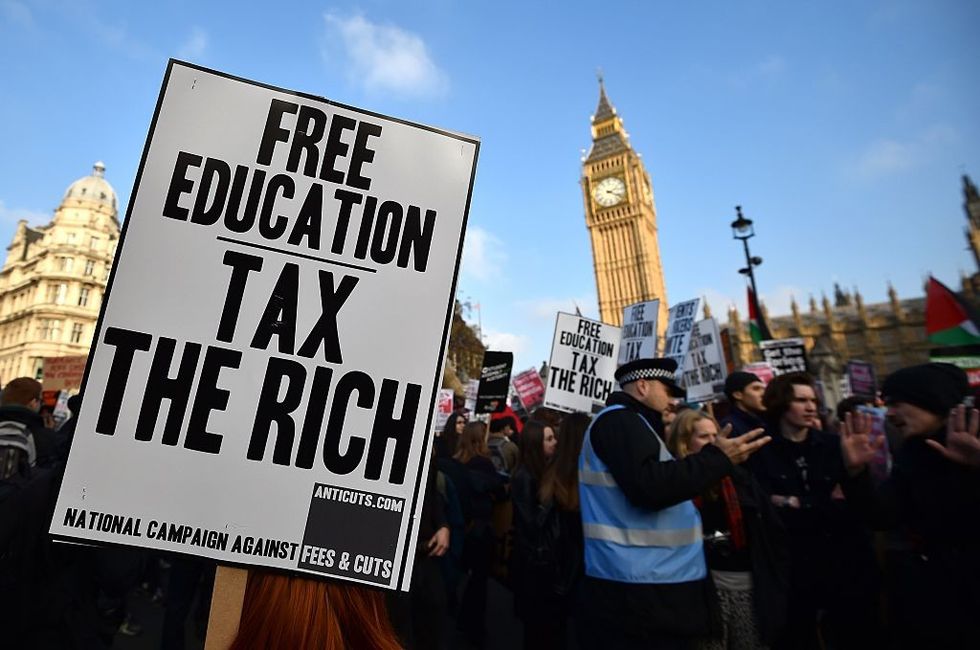RISING student debt is severely affecting students across Britain, who are already struggling with a cost-of-living crisis.
Britons heading to university next year face major changes that critics argue will worsen the financial pain.
The pressure is "exhausting, especially for someone in their 20s who has just started thinking about their career," said Rhiannon Muise, 21, who graduated from Edge Hill University in northwest England last year with a mountain of student debt.
Her current job as Edge Hill student engagement officer pays below the threshold that activates repayments.
UK graduates shoulder more debt than any other developed country, according to House of Commons Library data.
About 1.5 million students borrow nearly £20 billion in loans every year in England alone.
And on average, graduates of 2020 have amassed £45,000 in debt.
Zeno, a 25-year-old student in London who gave only his first name, said he owes just short of £75,000 for his loans.
Unless he "wins the lottery", he accepts he will probably be paying the money back from his salary for the next 30 years.
Tuition fee and other expenses
University used to be free in the UK, with means-tested grants for the poorest students to cover living costs.
But after the sector was opened up in the 1990s, numbers surged and, despite protests from student bodies, tuition fees have been gradually introduced in the last decade to help universities meet costs.
With education, a devolved matter for the governments in Scotland, Wales and Northern Ireland, different tuition fee arrangements are in place across the UK.
Accommodation and living costs are extra.

In England, undergraduate tuition fees are capped at £9,250 a year for the UK and Irish students -- up from £3,375 in 2011 when the government cut most ongoing direct public funding.
The cap in Wales is £9,000 and £4,030 in Northern Ireland.
Scottish students studying in Scotland pay £1,820 but those from the rest of the UK attending universities north of the border with England pay £9,250.
The picture is further complicated by rocketing inflation because the student loan interest rate is linked to the retail price index (RPI).
Loan interest is calculated by adding up to 3.0 percentage points to the RPI rate.
Inflation however soared to 30-year highs this year, particularly on rocketing energy costs and fallout from the Ukraine conflict.
Graduates could therefore pay an interest rate of 12 per cent from September -- or more if prices rise even higher.
The UK government plays a large part in student financing, providing loans that only demand repayment when a graduate earns above a threshold of £27,295 per year.
What borrowers repay depends on how much they earn. Unlike private lenders, they have up to 30 years to repay. The debt is cancelled after this time.
"This system is more progressive than in the US, with generous write-offs for lower-paid graduates," said Nick Hillman, director of the Higher Education Policy Institute in Oxford.
Current and recent students faced huge upheaval during courses due to coronavirus restrictions, with the pandemic also hitting job opportunities.
A combination of high debt repayments, high cost of living and wages that have failed to keep pace with inflation, add yet more stress.
£560 billion by 2050
Student finance poses a major conundrum for the public purse because the UK forecasts outstanding loans will top £560 billion by 2050.
From next year, Britain will lower the repayment threshold for new borrowers to £25,000 and lengthen the repayment time from 30 to 40 years.
This will however increase costs for low-earners while benefiting richer graduates who can pay back more quickly.
The UK government forecasts however that half of new students will repay their loans in full under the new plan.
Student debt has long been a concern in the US, where the Federal Reserve estimates that it amounts to a staggering $1.76 trillion.
US students on average have outstanding debt of close to $41,000, according to think-tank Education Data Initiative.
President Joe Biden this year extended a moratorium on student loan repayment and interest -- and is holding talks over partial debt write-offs.
(AFP)





